Fleurs du Mal Magazine


Or see the index
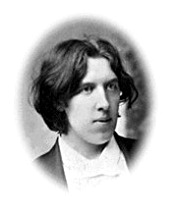 Oscar Wilde
Oscar Wilde
(1854 – 1900)
The Artist
One evening there came into his soul the desire to fashion an image of The Pleasure that abideth for a Moment. And he went forth into the world to look for bronze. For he could only think in bronze.
But all the bronze of the whole world had disappeared, nor anywhere in the whole world was there any bronze to be found, save only the bronze of the image of The Sorrow that endureth for Ever.
Now this image he had himself, and with his own hands, fashioned, and had set it on the tomb of the one thing he had loved in life. On the tomb of the dead thing he had most loved had he set this image of his own fashioning, that it might serve as a sign of the love of man that dieth not, and a symbol of the sorrow of man that endureth for ever. And in the whole world there was no other bronze save the bronze of this image.
And he took the image he had fashioned, and set it in a great furnace, and gave it to the fire.
And out of the bronze of the image of The Sorrow that endureth for Ever he fashioned an image of The Pleasure that abideth for a Moment.
Oscar Wilde, 1894
fleursdumal.nl magazine
More in: Archive W-X, Wilde, Oscar, Wilde, Oscar
 Oscar Wilde
Oscar Wilde
(1854 – 1900)
The Doer of Good
It was night-time and He was alone.
And He saw afar-off the walls of a round city and went towards the city.
And when He came near He heard within the city the tread of the feet of joy, and the laughter of the mouth of gladness and the loud noise of many lutes. And He knocked at the gate and certain of the gatekeepers opened to Him.
And He beheld a house that was of marble and had fair pillars of marble before it. The pillars were hung with garlands, and within and without there were torches of cedar. And He entered the house.
And when He had passed through the hall of chalcedony and the hall of jasper, and reached the long hall of feasting, He saw lying on a couch of sea-purple one whose hair was crowned with red roses and whose lips were red with wine.
And He went behind him and touched him on the shoulder and said to him, ‘Why do you live like this?’
And the young man turned round and recognised Him, and made answer and said, ‘But I was a leper once, and you healed me. How else should I live?’
And He passed out of the house and went again into the street.
And after a little while He saw one whose face and raiment were painted and whose feet were shod with pearls. And behind her came, slowly as a hunter, a young man who wore a cloak of two colours. Now the face of the woman was as the fair face of an idol, and the eyes of the young man were bright with lust.
And He followed swiftly and touched the hand of the young man and said to him, ‘Why do you look at this woman and in such wise?’
And the young man turned round and recognised Him and said, ‘But I was blind once, and you gave me sight. At what else should I look?’
And He ran forward and touched the painted raiment of the woman and said to her, ‘Is there no other way in which to walk save the way of sin?’
And the woman turned round and recognised Him, and laughed and said, ‘But you forgave me my sins, and the way is a pleasant way.
And He passed out of the city.
And when He had passed out of the city He saw seated by the roadside a young man who was weeping.
And He went towards him and touched the long locks of his hair and said to him, ‘Why are you weeping?’
And the young man looked up and recognised Him and made answer, ‘But I was dead once and you raised me from the dead. What else should I do but weep?’
Oscar Wilde, 1894
fleursdumal.nl magazine
More in: Archive W-X, Wilde, Oscar, Wilde, Oscar
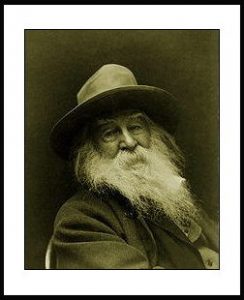
Walt Whitman
(1819 – 1892)
“So Long!”
1
To conclude–I announce what comes after me;
I announce mightier offspring, orators, days, and then depart,
I remember I said, before my leaves sprang at all,
I would raise my voice jocund and strong, with reference to consummations.
When America does what was promised,
When there are plentiful athletic bards, inland and sea-board,
When through these States walk a hundred millions of superb persons,
When the rest part away for superb persons, and contribute to them,
When breeds of the most perfect mothers denote America,
Then to me my due fruition.
I have pressed through in my own right,
I have offered my style to every one–I have journeyed with confident step.
While my pleasure is yet at the full, I whisper, ” So long!”
And take the young woman’s hand, and the young man’s hand for the last
time.
2
I announce natural persons to arise,
I announce justice triumphant,
I announce uncompromising liberty and equality,
I announce the justification of candour, and the justification of pride.
I announce that the identity of these States is a single identity only,
I announce the Union, out of all its struggles and wars, more and more
compact,
I announce splendours and majesties to make all the previous politics of
the earth insignificant.
I announce a man or woman coming–perhaps you are the one (“So long!”)
I announce the great individual, fluid as Nature, chaste, affectionate,
compassionate, fully armed.
I announce a life that shall be copious, vehement, spiritual, bold,
And I announce an old age that shall lightly and joyfully meet its
translation.
3
O thicker and faster! (“So long!”)
O crowding too close upon me;
I foresee too much–it means more than I thought,
It appears to me I am dying.
Hasten throat, and sound your last!
Salute me–salute the days once more. Peal the old cry once more.
Screaming electric, the atmosphere using,
At random glancing, each as I notice absorbing,
Swiftly on, but a little while alighting,
Curious enveloped messages delivering,
Sparkles hot, seed ethereal, down in the dirt dropping,
Myself unknowing, my commission obeying, to question it never daring,
To ages, and ages yet, the growth of the seed leaving,
To troops out of me rising–they the tasks I have set promulging,
To women certain whispers of myself bequeathing–their affection me more
clearly explaining,
To young men my problems offering–no dallier I–I the muscle of their
brains trying,
So I pass–a little time vocal, visible, contrary,
Afterward, a melodious echo, passionately bent for–death making me really
undying,–
The best of me then when no longer visible–for toward that I have been
incessantly preparing.
What is there more, that I lag and pause, and crouch extended with unshut
mouth?
Is there a single final farewell?
4
My songs cease–I abandon them,
From behind the screen where I hid, I advance personally, solely to you.
Camerado! This is no book;
Who touches this touches a man.
(Is it night? Are we here alone?)
It is I you hold, and who holds you,
I spring from the pages into your arms–decease calls me forth.
O how your fingers drowse me!
Your breath falls around me like dew–your pulse lulls the tympans of my
ears,
I feel immerged from head to foot,
Delicious–enough.
Enough, O deed impromptu and secret!
Enough, O gliding present! Enough, O summed-up past!
5
Dear friend, whoever you are, here, take this kiss,
I give it especially to you–Do not forget me,
I feel like one who has done his work–I progress on,–(long enough have I
dallied with Life,)
The unknown sphere, more real than I dreamed, more direct, awakening rays
about me–“So long!”
Remember my words–I love you–I depart from materials,
I am as one disembodied, triumphant, dead.
Walt Whitman poetry
fleursdumal.nl magazine
More in: Archive W-X, Whitman, Walt
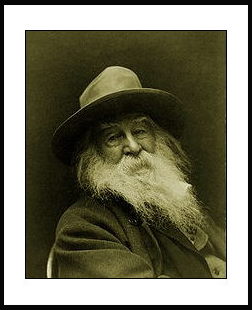
Walt Whitman
(1819 – 1892)
Poets to come!
1
Poets to come!
Not to-day is to justify me, and Democracy, and what we are for;
But you, a new brood, native, athletic, continental, greater than before
known,
You must justify me.
2
I but write one or two indicative words for the future,
I but advance a moment, only to wheel and hurry back in the darkness.
I am a man who, sauntering along, without fully stopping, turns a casual
look upon you, and then averts his face,
Leaving it to you to prove and define it,
Expecting the main things from you.
Walt Whitman poetry
fleursdumal.nl magazine
More in: Archive W-X, Whitman, Walt

Walt Whitman
(1819 – 1892)
Satan
Aloof, dissatisfied, plotting revolt,
Comrade of criminals, brother of slaves,
Crafty, despised, a drudge, ignorant,
With sudra face and worn brow–black, but in the depths of my heart proud
as any;
Lifted, now and always, against whoever, scorning, assumes to rule me;
Morose, full of guile, full of reminiscences, brooding, with many wiles,
Though it was thought I was baffled and dispelled, and my wiles done–but
that will never be;
Defiant I SATAN still live–still utter words–in new lands duly appearing,
and old ones also;
Permanent here, from my side, warlike, equal with any, real as any,
Nor time, nor change, shall ever change me or my words.
Walt Whitman poetry
fleursdumal.nl magazine
More in: Archive W-X, Whitman, Walt

Walt Whitman
(1819 – 1892)
Pulse of my life
Not heaving from my ribbed breast only;
Not in sighs at night, in rage, dissatisfied with myself;
Not in those long-drawn, ill-suppressed sighs;
Not in many an oath and promise broken;
Not in my wilful and savage soul’s volition;
Not in the subtle nourishment of the air;
Not in this beating and pounding at my temples and wrists;
Not in the curious systole and diastole within, which will one day cease;
Not in many a hungry wish, told to the skies only;
Not in cries, laughter, defiances, thrown from me when alone, far in the
wilds;
Not in husky pantings through clenched teeth;
Not in sounded and resounded words–chattering words, echoes, dead words;
Not in the murmurs of my dreams while I sleep,
Nor the other murmurs of these incredible dreams of every day;
Nor in the limbs and senses of my body, that take you and dismiss you
continually–Not there;
Not in any or all of them, O Adhesiveness! O pulse of my life!
Need I that you exist and show yourself, any more than in these songs.
Walt Whitman poetry
fleursdumal.nl magazine
More in: Archive W-X, Whitman, Walt

Hendrik Nicolaas Werkman
(1882-1945)
Gestadige beweging
printa printo
cito typo
composita
colorita
sano corpo
bene torbo
bras de more
ras te vore
vaste code
baste mode
tanto tempo
desto presto
ante poco
sito foco
ador amo
para diso
sin peccato
nil dacapo
bene vista
male jacta
poke d’ore
pido lore
paso retro
volte metro
Hendrik Nicolaas Werkman poetry
fleursdumal.nl magazine
More in: Archive W-X, De Ploeg, Hendrik Nicolaas Werkman, Werkman, Hendrik Nicolaas
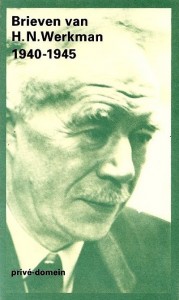
Hendrik Nicolaas Werkman
(1882-1945)
Sabbath der eenvoudigen
Zij dansen de bestemmingen van de mens
dat hij niet in het leven is geroepen
om te jachten en te jagen
dat het goed is van ophouden te weten
en te rusten en te lachen
die oeroude, maar vandaag op grote schaal
vergeten wijsheid dansen zij
H.N. Werkman
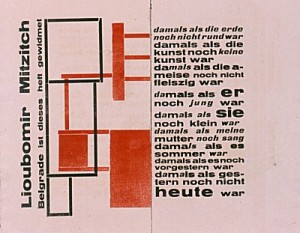
fleursdumal.nl magazine
More in: Archive W-X, De Ploeg, Hendrik Nicolaas Werkman, Werkman, Hendrik Nicolaas
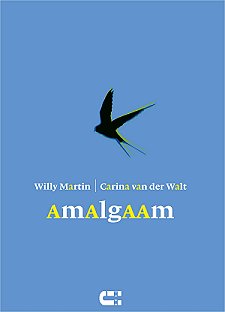 AMALGAAM een nieuwe Afrikaans/Nederlandse Dichtbundel
AMALGAAM een nieuwe Afrikaans/Nederlandse Dichtbundel
AMALGAAM is een duobundel met gedichten geschreven in het Nederlands (door Willy Martin) en in het Afrikaans (door Carina van der Walt).
AMALGAAM verschijnt in oktober bij Uitgeverij IJzer in Utrecht.
AMALGAAM bevat Afrikaans- en Nederlandstalige gedichten die niet per taal gescheiden, maar alfabetisch op titel gerangschikt staan.
Net zoals in ANNA (2011, Groot Woordenboek Afrikaans en Nederlands) zijn de gedichten uit de twee talen ‘geamalgameerd’, samen behandeld, als waren zij van één en dezelfde taal. Amalgamatie heeft voor de auteurs het voordeel dat zowel taalkundig als letterkundig grenzen kunnen worden afgetast en overschreden. De talen krijgen hun natuurlijke plaats in een vlechtwerk van verschuivende betekenissen. De nevenschikking van de talen zorgt ervoor dat latente krachten in beide talen helder in zicht komen. Niet alleen de verklarende kracht van woorden, maar ook de poëtische glans kan erdoor uitgelicht worden.
De Afrikaanstalige gedichten zijn van de hand van de Zuid-Afrikaanse dichteres en essayist Carina van der Walt, de Nederlandstalige van de Vlaming Willy Martin, emeritus hoogleraar aan de Vrije Universiteit te Amsterdam en hoofdredacteur van ANNA.
De officiële bundelpresentatie is op zondag 13 september 2015 om 11:00 uur Abdij Roosendael te Sint-Katelijne-Waver (bij Mechelen)
Gedichten en muzikale omlijsting zullen in het mooie kader van het abdijdomein aan het geheel een feestelijk karakter geven. Katelijne Boon (Vlaamse Radio en Televisieomroep, bekend van “De Ambassadeurs” op Klara) zal de auteurs interviewen en het programma coördineren.
Willy Martin & Carina van der Walt
Amalgaam
Prijs € 15,-
95 pag.
ISBN 978 90 8684 117 2
Verschijnt oktober 2015
Uitgeverij Ijzer, Utrecht
website: http://www.uitgeverij-ijzer.nl/
fleursdumal.nl magazine
More in: Archive M-N, Archive W-X, Art & Literature News, Carina van der Walt, TRANSLATION ARCHIVE, Walt, Carina van der, Willy Martin

Carina van der Walt
de wetenschap van afvalscheiding
we gaan elke dag zorgzamer om met
chemisch afval dat dampt
bedorven organisch afval
brillen glazen flessen
kranten kartonnen dozen
kleef- & bubbeltjesplastic
& het systeemprobleem restafval
maar we weten niet wat we moeten doen
met de mensen die van ver af aanspoelen
gebarsten als blauw porselein op het strand
een systeemfout: mensen zonder papier
die van ver af aanwaaien & als lege plastic-
zakjes blijven hangen aan het prikkeldraad
de rest moet bij zichzelf te rade gaan
op het zwerfvuil
met het etiket mens
plakken we graag een mengverbod
want uit gevaarlijk afval
kunnen gassen lekken
die imploderen of exploderen
maar composteren is toch kerngezond
Carina van der Walt poetry
fleursdumal.nl magazine
More in: Archive W-X, Carina van der Walt, Walt, Carina van der
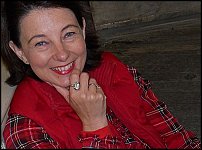
Carina van der Walt
bootramp by Lampedusa
die see offer 300 swart anemone
op die strande van Lampedusa
ontmenslik is hulle ledemate spons
wat in die vlak branders roer & roep
vryheid gelykheid broederskap suster Europa
aangespoel damp hulle lywe soutlug
droog hulle sagte oë gryswit & styf
verdamp verlangens verstil uitroepe
Europa kroon Lampedusa op sy strande
met segekranse van verwelkte anemone
Carina van der Walt poetry
fleursdumal.nl magazine
More in: Archive W-X, Carina van der Walt, Walt, Carina van der
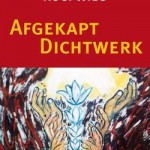 Na een lang ziekbed is op woensdag 15 juli 2015, in zijn woonplaats Amsterdam, de dichter, schrijver, beeldend kunstenaar en muzikant Rogi Wieg overleden.
Na een lang ziekbed is op woensdag 15 juli 2015, in zijn woonplaats Amsterdam, de dichter, schrijver, beeldend kunstenaar en muzikant Rogi Wieg overleden.
Rogi Wieg (1962) debuteerde als dichter in 1981. Zijn ouders waren Hongaarse vluchtelingen die zich in 1957 in Nederland hebben gevestigd.
Wieg werd, vanwege ernstige depressies, regelmatig opgenomen in psychiatrische ziekenhuizen en deed enkele pogingen tot zelfmoord. Zijn aanvraag voor euthanasie vanwege psychisch lijden werd onlangs gehonoreerd.
Zo zal ik niet sterven, maar ga ik
alleen een beetje dood.
(Rogi Wieg, 15 mei 2015)
fleursdumal.nl magazine
More in: Archive W-X, In Memoriam, Wieg, Rogi
Thank you for reading Fleurs du Mal - magazine for art & literature